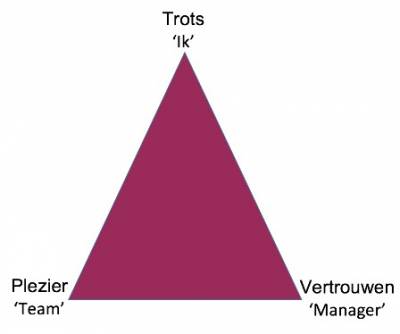Table of Contents
Vision on employees
Summary
The vision of the employee is an important starting point for the HR policy from Fontys and from Fontys ICT. The HR policy from Fontys is a guiding principle and that is where the HR course of Fontys ICT is embedded. This page describes how the HR policy within organisation is shaped and filled in. Talent development is a central concept here.
Fontys RACI ICT
To learn more about how this page fits within RACI, see the domain Management.
Introduction
Policy starts with a vision. A vision on who we are, what we do and why we do the things we do.
Fontys describes in its personnel policy Fontys Focus on Personeel & Organisatie (Human Resource Management) that Fontys stands for excellent education and thus the continuous improvement of the education. Growth of students and staff is stimulated, by challenge, big involvement and by personal attention: 'Growth through attention and challenge'.
Fontys gives institutions the freedom, maximum space and responsibility to achieve excellence in education. And so, in order to achieve the HR ambitions. Because she believes that in this way a personal identity and responsibility is created within institutions. The HR vision of Fontys ICT has been formulated on the basis of these thoughts. On the basis of the HR vision, current themes such as sustainable employability, professionalisation and leadership is given substance.
In this HR policy we have chosen to show what we as Fontys ICT strive for, this is our dot on the horizon. The HR policy is a guiding document in which the HR course of the Fontys ICT is embedded. Changes the course of the organisation significantly, then the vision and course of HR will change by itself. In addition, we want to show how we can make the most of the opportunities we are striving for, actually want to achieve; you will therefore also find a tactical / operational translation of the strategic goals.
Vision on employees
Heart for talent - enthusiasm as a driving force
Our employees form the heart of our organisation. They are the performers and supporters of our social task: education to young people, that fits in with the professional field. We bring out the best in people: talents are optimally validated. Because: 'Working from talent leads to happy employees and better results' (Dewulf & Beschuyt, 2013, transl.).
For our professionals, autonomy and competency are extra important. Employees at Fontys ICT are given a great deal of responsibility and autonomy to shape their own work, and (career) development. 'The real motivation comes from the work itself, from the autonomy and appreciation that employees receive, the extent to which the work challenges them, fits their talents and they feel that they can grow as professionals' (Dewulf & Beschuyt, 2013, transl.).
For the best connection to the professional field we recruit lecturers who come straight from professional practice and devote a great deal of attention and time to familiarising them with the teaching profession.
In our talent oriented vision on employees, personal conversations and attention to the individual are very important. Because:
'There's only talent when it's seen' (Dewulf, 2014, transl.). 'When people feel autonomously, feel competent and connected, they function better' (Dewulf & Beschuyt, 2013, transl.).
An important tool for talent development are the conversations that take place in all kinds of contexts. Discussions between manager and employee, between employees, between employees and students, between employees and cooperation partners, etc.
These conversations:
- Stimulate creativity and support the daredevil.
- Encourage participation and call into question decisions imposed from above.
- Ensuring time and attention for each other and for open communication.
- Are also about recognizing one's own mistakes and about improvements.
Figure 1
The triangle proud, pleasure and trust, anchored in the cooperation within Fontys ICT.
Managers hold discussions with employees from a growth mindset:
'In a growth-oriented employee interview, the emphasis is therefore on mapping out the ambitions and talents and then discussing how these can be 'scaled up'. This example makes it clear that a development interview is focused on strengths and does not mean that no attention is paid to shortcomings. However, the underdeveloped skill does not become the focus of change, but only means of realising personal ambition' (Aiello, 2010, p. transl. 288, transl.).
Talents give direction to change and development:
'In organisations it is not only about developing top talents., but also to motivate the average employee by identifying and developing slumbering talents. Spotting talent in this context is especially difficult, because it is usually not about the extreme top talent and because the bearer of the talent is often unaware of it and experiences his or her own way of being or doing it as being so self-evident, that it seems to him to be the most normal thing in the world' (Aiello, 2010, p. 286).
In HR policy there is a lot of space for individual needs and differences. The focus is on optimal cooperation and learning together. Formal procedures are in place to support this.
Literature
- Ailello, H. (2010). Talent development: opsporen en ontwikkelen van talent in organisaties. In: Lazeron N., & van Dinteren R. (red.), Brein@Work (pp. 283 - 292). doi:https://doi.org/10.1007/978-90-313-7816-6.
- Dewulf (2014, transl.). Ik kies voor mijn talent. Culemborg: Van Duuren.
- Dewulf & Beschuyt, 2013, transl.). Mijn baas kiest voor mijn talent: hoe verbind je talenten van mensen met excellente resultaten?. Culemborg: Van Duuren.

